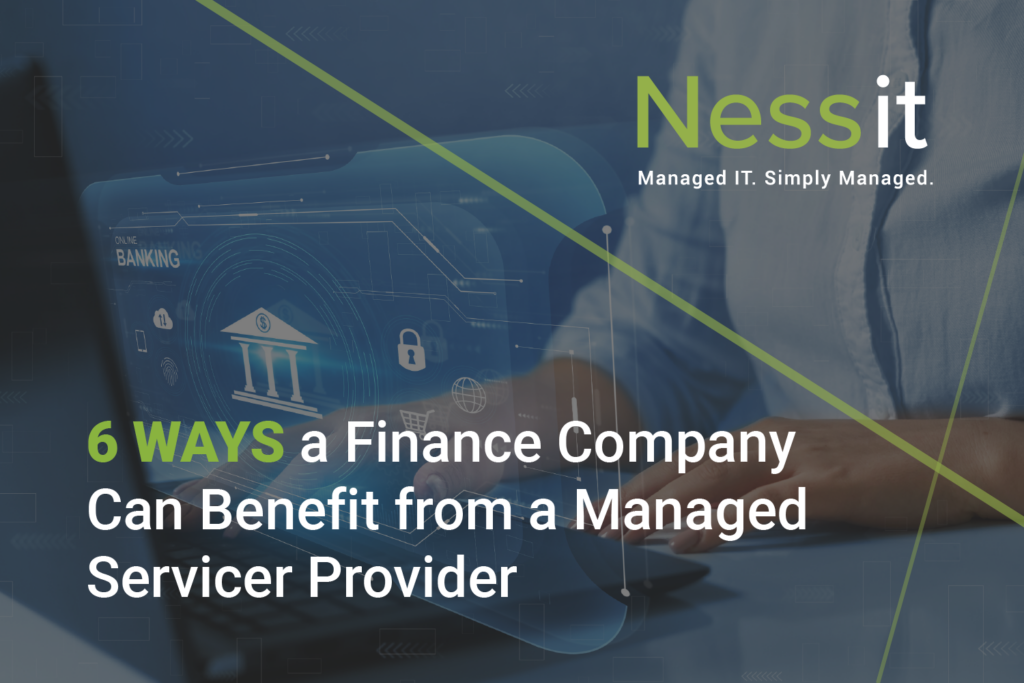Financial services companies experience unique challenges when it comes to IT and security, as every aspect of your business–from operations to regulatory compliance to processing transactions–depends on having a mature IT infrastructure in place.
Finance companies need a strong internal IT team and/or a responsive IT partner who can ensure your data, and your customers’ data, remains secure.
Here are 6 things finance companies should be focused on when it comes to your IT infrastructure:
- Enhanced Security
With sensitive financial data at stake, the risk of cyberattacks is an ongoing concern for financial institutions. Companies should ensure they have proactive security measures in place to protect against breaches, malware, and other emerging threats and offer training so employees can recognize phishing attempts and practice safe password management.
Finance companies need to adhere to state and federal security standards regarding data privacy and security. Your IT provider should be well-versed in government-regulated standards, and able to implement a layered security solution to safeguard sensitive information and control access.
- 24/7 Monitoring and Support
Financial operations run around the clock, and so should your IT support. 24/7 monitoring ensures your systems are always up and running. In the event of an issue, you want an IT team that will be available to provide immediate assistance, minimizing disruption and maintaining efficient operations.
Your IT services provider should begin with an audit to identify any vulnerabilities in your current systems and design a plan to fix them. Long-term management will include ongoing updates and patches to maintain security and avoid costly emergency fixes.
- Business Continuity
Downtime can have a disastrous impact on financial firms. When a system failure occurs and employees are unable to work for an extended period, the consequences are costly. That’s why it’s important to have a business continuity plan in place. Your IT service provider should have an in-depth knowledge of the finance industry and take the time to understand how your company works. That will allow them to identify potential points of failure and create a plan to get you back in business with minimal downtime.
Depending on your company’s needs and the potential severity of an interruption to operations, your business continuity plan may include a failover recovery system. Failover is a backup system that syncs all your data to a server at an offsite location so the duplicate system can take over if the primary server is disabled.
- Proactive Management
Rather than waiting for problems to arise, finance companies need to take a proactive approach to IT management. With continuous monitoring, potential issues can be dealt with before they become significant problems. In an industry where timing is crucial, being proactive will reduce the risk of system failures, data loss, and downtime that can impact day-to-day operations and damage your company’s reputation.
A well-thought-out backup plan is essential to any financial firm to eliminate the possibility of lost data or work that has to be re-done. To make sure your data can be quickly restored, your IT provider should run regular recovery system tests.
Your in-house IT team or managed service provider is responsible for keeping your company systems up-to-date and patching potential points of failure. They will also recommend and facilitate hardware, software, and system upgrades when necessary to maintain IT maturity.
- Scalability and Flexibility
Finance companies should have an IT infrastructure that’s flexible and scalable so it can easily grow with your business. Fluctuations in demand can mean greater volumes of data, transactions, and storage requirements, and the ability to adapt to changes quickly is essential.
Your IT provider should be able to scale your resources–from cloud storage to network capacity–so your company stays competitive, agile, and prepared for future growth. Whether you’re expanding your markets, onboarding employees, or integrating new technologies, effective IT management will ensure that your systems can seamlessly adapt to meet your business needs.
- Expertise and Innovation
For finance companies, it’s important to have an IT infrastructure that can keep pace with change in order to handle everything from cyber threats to new industry regulations to rapid market fluctuations. You want a provider with deep expertise who is always looking for new ways to improve your systems and streamline operations.

Whether your IT is managed in-house or by an MSP, your team needs to be proactive in implementing the latest technologies, security solutions, and best practices to ensure your business needs are supported by your infrastructure. Having an IT partner who brings both experience and innovative ideas can make all the difference in keeping your company efficient, forward-thinking, and future-ready.
Technology is the backbone of the finance industry and effective IT management is critical to success. You need a trusted partner that will tailor their services to meet your company’s specific needs, ensuring your infrastructure is secure, reliable, and efficient. Contact us to learn more about how our managed IT services can give you peace of mind and enable you to achieve your business goals.
